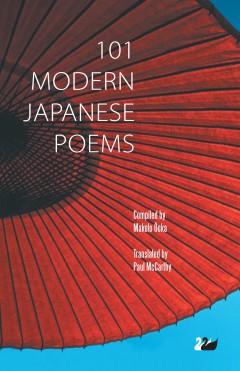101 Modern Japanese Poems
Translated by Paul McCarthy
Compiled by
- About This Book
- Reviews
- Author Information
- Series
- Table of Contents
- Links
- Podcasts
About This Book
This remarkable anthology features 101 modern Japanese poems by 55 poets, including Shuntarō Tanikawa, Minoru Yoshioka, Taeko Tomioka, Nobuo Ayukawa, Tarō Kitamura, Ryūichi Tamura, Hiroshi Yoshino, Noriko Ibaragi, Gōzō Yoshimasu and Yōji Arakawa, carefully selected by the renowned poet and literary critic Makoto Ōoka to ensure that the chosen poems express each poet’s special character. The collection provides a superb introduction to Japanese poetry from the immediate postwar period to the mid-1990s, and through these works one can sense the movement in poetry that reflected the challenging transitions and dizzying transformations occurring in postwar and contemporary Japan. Selected for inclusion in the Japanese Literature Publishing Project (JLPP) by the Japanese Agency for Cultural Affairs, this first-ever English edition has been translated by Paul McCarthy with both empathy and artistic felicity, and also includes a critical introduction by the Japanese poet and essayist Chūei Yagi. Suitable for both the student/scholar of modern Japanese literature and the general reader with a passion for poetry, the 101 poems in this authoritative collection will delight and inspire.
Reviews
“This expansive anthology is essential and rewarding reading to all those interested in modern Japanese poetry. ” —Review of “101 Modern Japanese Poems” at “Readings in translated Japanese Literature”
Author Information
Makoto Ōoka (1931– ) is a renowned Japanese poet and literary critic. Ōoka’s poetry column ‘Ori Ori no Uta’ was published every day for 28 years from 1973 in Japan’s leading national newspaper ‘Asahi Shimbun’.
Paul McCarthy has taught Japanese literature at universities in the United States and comparative literature at universities in Japan and Korea for the past 40 years. His translations include Jun’ichirō Tanizaki’s novella ‘A Cat, a Man and Two Women and Other Stories’, which won the 1991 U.S.-Japan Friendship Commission Prize for Translation of Japanese Literature, as well as other works by Tanizaki, Atsushi Nakajima and Mieko Kanai.
Series
Table of Contents
Preface by Makoto Ōoka;
Translator’s Note by Paul McCarthy;
Introduction by Chūei Yagi;
Hitoshi Oikawa: Eyes Straight Ahead. Zigzagging.;
Yoshirō Ishihara: Funeral Train / Ashikaga;
Saburō Kuroda: The Bet / Three O’clock on an Autumn Afternoon / Birthday;
Minoru Yoshioka: The Past / Monks / Picking Saffron Flowers;
Sakon Sō:Personal History;
Tsuguo Andō: Sleet;
Masao Nakagiri: Personnel Affairs;
Hitoshi Anzai: In the Morning, the Phone Rings / Elevator Mornings;
Hiroshi Sekine: Leaving This Room / A Single Strange Step;
Rin Ishigaki: Shijimi Clams / Name-plates / Land / Houses;
Nobuo Ayukawa: A Morning Song at the Moored Boat Hotel / Heaven / If Now You Suffer;
Toyoichirō Miyoshi: Prisoner / Our Song of a May Night;
Tarō Naka: Tower / The Sea of Sleep;
Takayuki Kiyo’oka: Alabaster / Through the Ear / An Ecstasy of Sloth;
Tarō Kitamura: Rain / Morning Mirror;
Ryūichi Tamura: Etching / Sinking Temple / The Gods of Poetry;
Taka’aki Yoshimoto: Descent to a Singular World / At Tsukuda Ferry;
Hiroshi Yoshino: I Was Born / Evening Afterglow / Epithalamium;
Noriko Ibaragi: When I Was at My Prettiest / It’s Your Own Sensibility / A Tree’s Fruit;
Minoru Nakamura: Night / The Kite;
Takashi Tsujii: The White Horse;
Ryūsei Hasegawa: The Laborer’s Eyes;
Eriko Kishida: The Soundless Girl / Why Do Flowers Always;
Kazue Shinkawa: Don’t Bunch Me / Song;
Hiroshi Kawasaki: Swan / Wedding March / Walls of Lead;
Kōichi Iijima: Understanding / Mother Tongue / The Roads of Miyakojima;
Chimako Tada: First Dream of the New Year;
Takasuke Shibusawa: A Crystal Madness / Ode on Passing through Winter;
Makoto Ōoka: For Spring / On Place Names / Chōfu V;
Masami Horikawa: Fresh Pain-filled Days;
Kazuko Shiraishi: Bird / Penis (for Sumiko’s birthday);
Toshikazu Yasumizu: The Bird – in four chapters;
Yasuo Irisawa: Untitled Song / Unidentified Flying Object / Memories of Paradise;
Shuntarō Tanikawa: Sorrow / An Elaboration of the Way to My House / Mt. Yōkei;
Hiroshi Iwata: A Hateful Song / The Ordeal of the Animals;
Ryōko Shindō: The Plains;
Sachiko Yoshihara: Nonsense;
Toriko Takarabe: Field Notes at Bakoton, Kitsurin;
Toshio Nakae: Night and Fish / Vocabulary Collection, Chapter 29;
Moto’o Andō: A Difficult Walk;
Taku Miki: A Guest has Come;
Shirōyasu Suzuki: Confessional-Fiction Virgin Kiki’s Favorite Form of Play / The Name Sōta;
Taeko Tomioka: Life Story / Still Life;
Taijirō Amazawa: Morning River / Counter-Western;
Mutsuo Takahashi: The Rose Tree / Research on Weeds;
Tetsuo Shimizu: Charlie Brown;
Rie Yoshiyuki: The Blue Room;
Yukio Tsuji: Kameido;
Takahiko Okada: Borrowing the Name of Love Song / Endure the Splits and Wander On!;
Hiroshi Osada: How to Eat Radish Wheels;
Akira Shimizu: Stranded Ship;
Gōzō Yoshimasu: Burning / First Bath;
Mikirō Sasaki: Rhododendron Hotel;
Yōji Arakawa: The Greenery in Mitsuke;
Hiromi Itō: So as Not to Warp Them
List of Sources / Index of Poets / Index of Titles
Links
Stay Updated
Information
Latest Tweets



